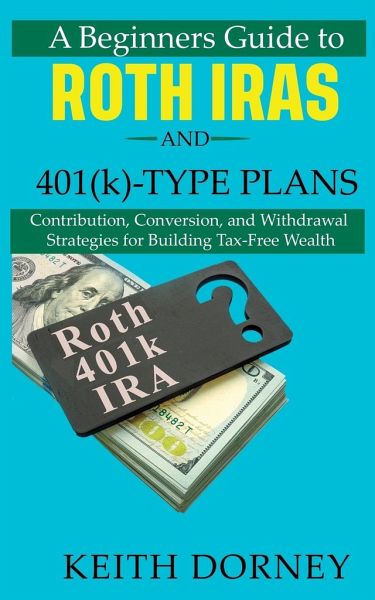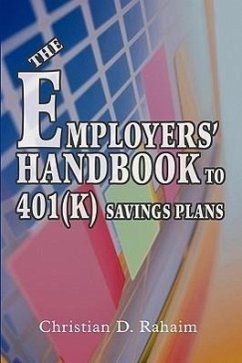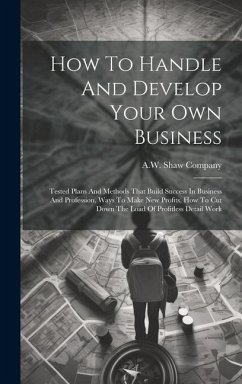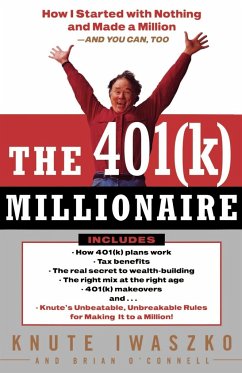
A Beginners Guide to Roth IRAs and 401(k)-Type Plans
Contribution, Conversion, and Withdrawal Strategies for Building Tax-Free Wealth
Versandkostenfrei!
Versandfertig in 1-2 Wochen
20,99 €
inkl. MwSt.

PAYBACK Punkte
10 °P sammeln!
Roth IRA and 401(k)-Type Plan Options Explained Investment vehicles like a Roth IRA and any employer-sponsored Roth option you may be offered should be part of your investment plan for financial independence. If you don't have an investment plan for financial independence, A Beginners Guide to Roth IRAs and 401(k)-Type Plans will help you come up with one that minimizes your risk and maximizes your profits. Do you have a Roth option in your 401(k), 403(b), 457, 401(a), TSP, or other defined contribution plan at work? If yes, fantastic! Not all employers offer a Roth option. (Some offer no opti...
Roth IRA and 401(k)-Type Plan Options Explained Investment vehicles like a Roth IRA and any employer-sponsored Roth option you may be offered should be part of your investment plan for financial independence. If you don't have an investment plan for financial independence, A Beginners Guide to Roth IRAs and 401(k)-Type Plans will help you come up with one that minimizes your risk and maximizes your profits. Do you have a Roth option in your 401(k), 403(b), 457, 401(a), TSP, or other defined contribution plan at work? If yes, fantastic! Not all employers offer a Roth option. (Some offer no option at all.) Take advantage, but you'll still want to open and fund a Roth IRA for several reasons. Take advantage of all the tax breaks afforded you. Why? Everything else being equal, you'll earn a higher rate of return in tax-advantaged accounts than you would in regular taxable ones. As you invest over the years, returns are amplified by those advantages. These investment vehicles are the low-hanging fruit as far as your financial independence goes. You've got to max them out the best you can. Add low investment fees and a great stock and securities investing plan and you've created one of the most effective investing tools on the planet! Jumpstart Your Prosperity Are you a novice investor who's just getting started? Maybe you want to help your kids save, invest, and become more financially literate. A Beginners Guide to Roth IRAs and 401(k)-Type Plans provides the information and insight needed to reach those financial goals. Roth investments enjoy tax-free earnings. The longer your time horizon for investment, the more you'll benefit from tax-free earnings. As the years go by, you'll add traditional (pre-tax) and regular taxable account investments to the mix too. Learn how to integrate these multiple accounts into a single investment plan for financial independence, as well as optimally position them tax-wise. Over the Income Limits for Contributing to a Roth IRA? Think you can't contribute to a Roth IRA because you're over the income limits? Think again. In fact, you may be able to fund your Roth IRA on a yearly basis well above the contribution limits. Learn how to execute these perfectly legal conversions from a traditional IRA (backdoor Roth) and a 401(k)-type plan (mega-backdoor Roth). These Roth conversions may sound a little sneaky and underhanded, but they're totally legit, at least for now. In the past, Congress has tried unsuccessfully to outlaw these maneuvers, so take advantage while you still can! A Beginners Guide to Roth IRAs and 401(k)-Type Plans Answers All of Your Roth Questions As a financial educator at corporations and universities, I get asked all kinds of Roth-oriented questions. I take pride in explaining even the most complex issues in easy-to-understand language. Here's a sampling:Can I tap my Roth IRA before age 59 1/2 without tax or penalty? My employer offers both a traditional and Roth option. Should I be making Roth or traditional contributions? Should I roll my old company plan into my present employer's plan or an IRA? My employer offers a Roth option: Why should I still invest in a Roth IRA? Are there any downsides to converting after-tax non-Roth contributions to my Roth IRA from my company's plan or from a traditional IRA? I'm interested in converting money to a Roth IRA. How much tax will I owe, and when is the best time to do it? Max Out Roth Accounts In your quest for financial independence, start maximizing your earnings by adding Roth accounts to your investing lineup. Take control of your investing future. The best time to start is right now!












